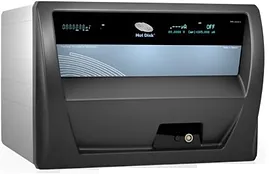With just one measurement, the Hot Disk TPS technique can quickly and easily estimate the material's thermal diffusivity and thermal conductivity. It also gives the user a volumetric heat capacity based on the relationship between these thermal properties.

Hot Disk Thermal Constants Analyzer. Image Credit: Orton Ceramic Foundation
Method
- The Hot Disk Thermal Constants Analyzer employs a transiently heated plane sensor (a Nickel double spiral) sandwiched between two thin sheets of an insulating material (Kapton, Mica, etc.) following the Transient Plane Source (TPS) approach.
- To achieve a satisfactory contact, insert the sensor between two similar substance samples. This can be readily achieved by facing the sample with a flat surface. One of the many benefits of the Hot Disk is the reduced criticality of the remaining sample geometry.

Hot Disk Kapton sensor. Image Credit: Orton Ceramic Foundation
Range of Materials, Thermal Conductivity, and Temperatures
- Materials that are tested can be liquids, thin films, powders, pastes, or even solids (thickness from 20 to 600 microns). Numerous materials, including metals, alloys, minerals, ceramics, glasses, powders, plastics, building materials, biomaterials, liquids, etc., have been studied using the Hot Disk Thermal Constants Analyzer.
- The range of achievable thermal conductivity measurements is a few mW/m/K to around 1800 W/m/K.
- Temperatures between around -250 °C and 1000 °C can be measured. Mica sensors should be utilized at higher temperatures, but Kapton sensors can be used from cryogenic temperatures up to 300 °C. Teflon sensors are also useful in harsh or corrosive environments.
Sensors and Sample Dimensions
The sample's smallest dimension (such as thickness) should not be less than the sensor's radius. A wide range of sensor sizes is available, with radii that go from less than 1 mm (for very small samples) to roughly 30 mm. If at all possible, it is advised to use larger samples with the larger sensor. Users can find a range of sensor kinds and sizes accessible here.
Additional Capabilities
Anisotropy
The TPS contains a unique module to differentiate between axial (through-thickness) and radial (in-plane of the sensor) thermal conductivities. It can test both isotropic and anisotropic materials.
One-Dimensional Measurement
Using a unique one-dimensional module, the thermal conductivity and diffusivity can be assessed along this axis when the sample geometry or dimensions are limited to a small diameter or cross-section but sufficient in the axial direction (rod-shaped samples).
Single-Sided Testing
One-sided testing, in which an insulating substance supports the sensor, can be utilized if only one sample is available for measurement. An insulating material's thermal conductivity should be around an order of magnitude lower than the tested sample's predicted conductivity.
Direct Heat Capacity Characterization
The material's heat capacity can be directly tested thanks to a specially-made sample holder and heat capacity module.
TPS accessories are available in a wide range to meet all of the application requirements.
The International Organization for Standardization (ISO) standard ISO 22007-2 governs how the TPS method functions.
Orton Ceramic has officially joined forces with Hot Disk AB to serve as the authorized distributor of Hot Disk TPS in the Eastern USA, Central America, and South America. Additionally, Orton Ceramic provides Thermal Analytical Instruments and Material Testing services for precise measurement of thermal properties.